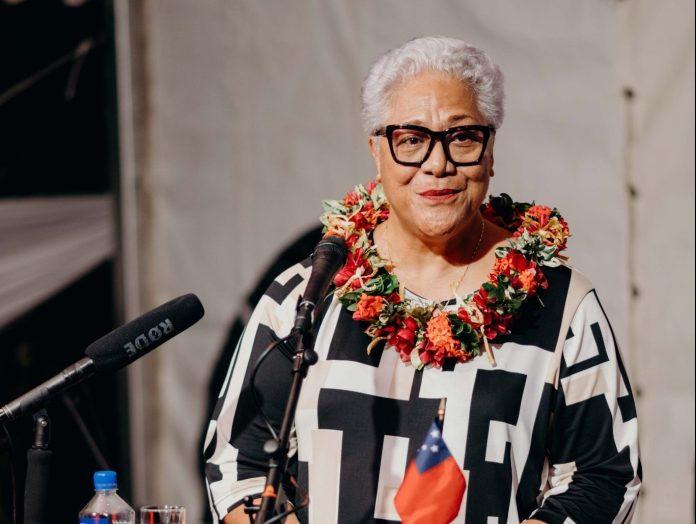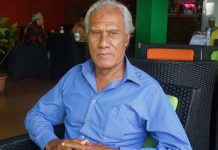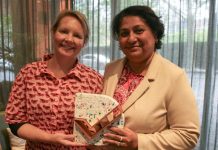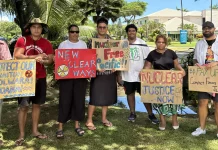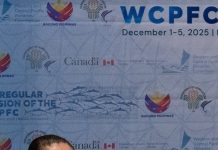Fiamē Naomi Mata’afa, Prime Minister and Minister for Foreign Affairs of Samoa, gave the keynote address at the inaugural Pacific Islands Forum Women Leaders Meeting on 8 June 2022. This is the transcript of that speech
By Samoan Prime Minister and foreign Minister, Fiamē Naomi Mata’afa
I am delighted to provide this address for the inaugural meeting of Pacific Islands Forum Women Leaders. As Samoa’s first female Prime Minister, a Samoan matai, a woman leader in my family, extended family and village community, and long-time cabinet minister and representative of my country, this is both a privilege and an honour. On behalf of my government, I express deep appreciation to you.
We have an expression in Samoa: “E au le ina’ilau a tama’itai”. Women achieve what they set out to do.
Our meeting today deals with an issue so fundamental in character, and so often shaped by the interests of so many. When viewed through different lenses, be they political, economic, social or environmental, the commitment to and implementation of priorities to promote and advance gender parity in leadership and decision-making, and the empowerment of all women and girls, will always vary. It is high time we re-focus our attention on further employing effective interventions in support of these efforts.
Our meeting is to “ensure an enduring focus on the critical role gender has on issues in the Pacific”.
The “issues in the Pacific”, as many of you will know, are copious, complex, and intricate. They are nonetheless central to our wellbeing and sustainable development efforts. If ever there was a more appropriate time to further advance gender equality priorities and integrate gender perspectives across the raft of challenges that we face in our Blue Pacific region – that time is now.
Pacific women have and continue to contribute to the advancement of gender equality and the empowerment of women and girls through our culture and traditions, families, village communities, private sector, civil society organisations, governments, and legislative bodies. The glass ceiling may still exist today across various sectors and parts of our societies, but we are, most assuredly, bringing these barriers down.
The spread of the pandemic across our Blue Pacific region has been relentless, the impacts significant. The acute socio-economic impacts of COVID-19 that we are facing will no doubt be significantly compounded by the effects of climate change and natural disasters. These add to existing challenges and vulnerabilities faced by our communities across all sectors.
Forum Leaders have declared climate change as the single greatest threat to the livelihoods, security and wellbeing of the peoples of the Pacific. Taken together, these considerations are critical to any dialogue we hold in our plans to build back better post-COVID-19.
I want to recognise the significant and bold strides we have made in gender equality policies and legislation in our region and countries over these past two decades. Through the CEDAW, the Beijing Platform for Action, the Convention on the Rights of the Child, the SAMOA Pathway, the 2030 Agenda and SDGs, regional agreements like the 2012 Pacific Leaders Gender Equality Declaration, the SPC’s triennial Conferences of Pacific Women and various human rights and UPR reports to name a few, these continue to drive and inform our work today.
But as with many developmental aspirations, women and girls continue to face challenges and barriers in advancing these important efforts. The pandemic has had a marked impact on our people and their livelihoods, particularly on key industries such as tourism, causing a slowdown in our efforts towards achieving sustainable development.
Our focus is to ensure the social wellbeing of our citizens, in particular women and children, and vulnerable groups affected by the downturn in the trajectory of socio-economic development and increased poverty. Our response also includes community outreach on preventative measures as well as on gender-based violence. We are committed to building a nation in which our women and girls are able to realise their full potential – from shaping the future of their families to shaping the future of the nation. It is our collective responsibility to empower women and girls economically, socially, educationally and also politically.
COVID-19 has exacerbated domestic violence and gender-based violence. The social and economic costs and impacts of family violence on our countries and families are high and we will spare no effort to address domestic violence, including violence against women and children. Our commitment and determination to defeat this issue is a whole-of-government and whole-of-community approach.
We must continue to advocate strongly for the promotion, respect for, protection and fulfilment of all human rights and fundamental freedoms, without distinction of any kind, to ensure that no one is left behind.
Excellencies, and sister participants, women are every bit as capable of being good responsible leaders as men. We need to move beyond rhetoric and enhance our effort to promote and educate, and to lift the representation of women in decision-making roles in politics, businesses, and communities. We must do better to strengthen outcomes for women and girls across key national and regional priorities and ensure that Pacific women and girls are not left behind.
We must also improve connectivity in all viewpoints so that there are coordinated, collaborative and effective approaches to implementation. If we did all this, we can advise Forum Leaders on the priorities and work with all our CROP agencies and partners to translate their decisions into tangible progress.
The irony is not lost on me that at the present time, there are only two women heads of government at the Forum Leaders’ meeting. This however should not diminish the important role and contribution of Forum Leaders in this work and I wish to pay tribute to all our male Forum Leaders, past and present, and all Pacific men who have and continue to champion gender equality and the empowerment of all women and girls alongside us.
The importance of partnership to our development aspirations cannot be understated. I wish to warmly acknowledge the support of all our development partners, CROP agencies, the UN and intergovernmental agencies, and CSOs and the private sector – thank you for your continued assistance and support to our Blue Pacific region and countries.
To all women leaders, present and past, and to sister participants from our Blue Pacific in all their diversities, I salute you. Soifua.
SOURCE: THE INTERPRETER/PACNEWS






